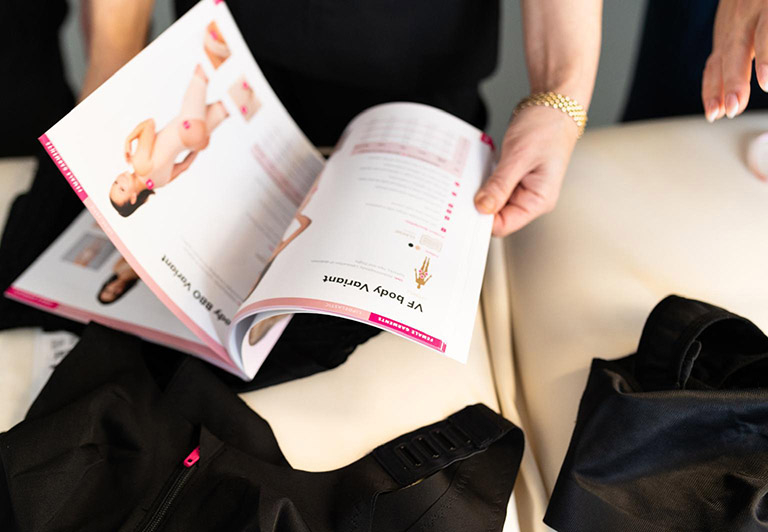
Plastic Surgery Recovery Information for Patients of Plastic Surgeon Anca Breahna
Recovery is an integral part of any medical or cosmetic procedure. It’s the phase where the body heals, rejuvenates, and adapts post-treatment. While the expertise of your plastic surgeon plays a pivotal role in ensuring successful outcomes, the post-treatment care you provide yourself is equally crucial.
In this page, Chester Consultant Plastic Surgeon Anca Breahna, aims to guide you through the essential steps and best practices to ensure a smooth, comfortable, and effective recovery journey. Whether you’ve undergone a surgical procedure or a non-invasive treatment, these guidelines will empower you with the knowledge to optimise your healing process and achieve the best possible results.
General Recovery Tips
The journey to recovery, irrespective of the treatment or procedure you’ve undergone, is a delicate phase that demands attention, patience, and adherence to specific guidelines. While each procedure might have its unique post-treatment instructions, some general recovery tips are universally applicable and can significantly enhance the healing process.
- Importance of Rest
Rest is the body’s natural mechanism for healing and rejuvenation. After any medical or cosmetic procedure, it’s paramount to give your body ample time to heal. This doesn’t just mean sleep, although a good night’s sleep is invaluable. It also refers to reducing physical exertion, avoiding strenuous activities, and allowing your body to channel its energy towards healing. Overexerting yourself can lead to complications, prolong the recovery period, and even affect the results of certain treatments.
- Following Anca Breahna’s Instructions
Your plastic surgeon will equip you with a set of post-treatment instructions tailored to your specific procedure. These guidelines are based on years of medical research and experience and are designed to ensure your safety and the efficacy of the treatment. It’s essential to adhere to these instructions diligently. Whether it’s about medication dosage, wound care, or activity restrictions, these guidelines are there for a reason. Deviating from them can jeopardise your recovery and the success of the treatment.
- Monitoring for Unusual Symptoms
While some discomfort, swelling, or redness might be expected after certain procedures, it’s crucial to stay vigilant for any unusual or severe symptoms. Persistent pain, excessive bleeding, signs of infection, or any other unexpected changes should be reported to your medical team immediately. Early detection and intervention can prevent complications and ensure a smoother recovery trajectory.
- Hydration and Nutrition
The body’s healing process is significantly enhanced with proper hydration and nutrition. Drinking plenty of water aids in flushing out toxins, improving skin health, and maintaining vital bodily functions. Meanwhile, a balanced diet rich in vitamins, minerals, and essential nutrients supports cellular repair and boosts the immune system. Foods rich in vitamin C, zinc, and protein can particularly aid in wound healing and tissue regeneration.
- Avoiding Harmful Substances
Post-treatment is not the time to indulge in habits that can impede your recovery. Smoking, for instance, can delay wound healing, increase the risk of complications, and even affect the results of some cosmetic procedures. Similarly, excessive alcohol can interfere with medications and the body’s natural healing processes. It’s advisable to abstain from or limit the consumption of such substances during the recovery phase.
- Emotional Well-being
Physical recovery is just one aspect of the healing journey. Emotional well-being plays a significant role in how quickly and effectively you recover. It’s natural to feel a range of emotions post-treatment, from relief and happiness to anxiety or sadness. Recognising these emotions, talking about them, and seeking support when needed can make the recovery process more manageable and less daunting.
- Environment and Support System
Your environment can influence your recovery. Ensure you have a comfortable, clean space to rest. If possible, make arrangements for someone to assist you in the initial days post-treatment, especially if mobility is restricted. Having a support system, be it family, friends, or caregivers, can make a world of difference in your recovery journey.
Post-Surgical Care
Post-surgical care is a critical component of the recovery process, especially after undergoing invasive procedures. Proper care can mean the difference between a smooth recovery and potential complications. Here are some instructions for post-op care:
Wound Care and Hygiene
The site of the surgery requires meticulous care to prevent infections and promote healing. Always ensure your hands are clean before touching the area. Depending on Anca’s advice:
- Clean the wound with mild saline water or as directed
- Avoid scrubbing the area; pat it gently
- If dressings are applied, change them as recommended, ensuring the area remains dry and clean
- Avoid using any ointments or creams unless prescribed
Signs of Infection
While some redness and swelling are normal, it’s essential to be aware of signs that might indicate an infection:
- Increased redness or warmth around the wound
- Persistent or worsening pain
- Discharge or pus from the wound
- Foul odour emanating from the site
- Fever or chills. If you notice any of these signs, contact your medical team immediately
When to Remove Bandages or Dressings
Anca will provide specific instructions on when and how to change or remove dressings. It’s crucial to follow these guidelines to the letter. Removing them too early or too late can both have adverse effects on the healing process.
Medication and Pain Management during Recovery after Plastic Surgery
The aftermath of a medical or cosmetic procedure often involves managing discomfort and ensuring optimal healing. Medications play a pivotal role in this phase, addressing pain and preventing potential complications. However, the use of medications, while beneficial, requires careful consideration and adherence to guidelines to maximise their efficacy and minimise risks.
Taking Medications as Prescribed
When your plastic surgeon prescribes medication post-procedure, it’s tailored to your specific needs, considering factors like your medical history, the nature of the procedure, and potential risks. Adhering to the prescribed dosage and schedule is crucial for several reasons:
- It ensures consistent relief from pain or discomfort
- It can prevent potential complications, such as infections or inflammation
- It minimises the risk of adverse reactions or overdose. Always take the full course of antibiotics, even if you feel better, to ensure complete eradication of any potential bacterial threats
Avoiding Over-the-Counter Medications without Consultation
While over-the-counter (OTC) medications are readily available and might seem harmless, they can interact with prescribed drugs or adversely affect your recovery. For instance:
- Some OTC pain relievers can increase the risk of bleeding, especially after surgical procedures
- Certain OTC drugs can counteract the effects of prescribed medications
- Some might exacerbate side effects or introduce new ones. Before taking any OTC medication, always consult with Anca. She can guide you on safe options that won’t interfere with your recovery or prescribed medications
Managing Side Effects
Almost all medications come with potential side effects. While many of these are mild and temporary, it’s essential to be aware of them and manage them effectively:
- Stay informed: Before starting any medication, read the accompanying information or consult with your pharmacist or doctor about potential side effects
- Monitor your body: Pay attention to any changes, however minor, after starting a new medication. This includes physical symptoms, mood changes, or alterations in sleep patterns
- Stay hydrated: Drinking plenty of water can help flush out medications and reduce certain side effects like dizziness or dry mouth
- Report severe or persistent side effects: If you experience any severe reactions or if mild side effects persist, contact your GP or plastic surgeon immediately. They might adjust the dosage, change the medication, or provide solutions to manage the side effects
Physical Activity during Recovery
The road to recovery after a plastic surgery procedure isn’t just about rest and medications. Physical activity and rehabilitation play a crucial role in ensuring a complete and effective recovery. While it might seem counterintuitive to move and exert oneself post-procedure, the right kind and amount of physical activity can significantly aid the healing process.
Recommended Exercises
Depending on the nature of the procedure, Anca will recommend specific exercises tailored to your needs. These exercises are designed to:
- Improve blood circulation, which can expedite the healing process
- Maintain or regain flexibility and range of motion
- Strengthen muscles, especially if they’ve been affected or weakened due to the procedure or prolonged rest
- Reduce the risk of complications such as blood clots or muscle atrophy. Examples might include gentle stretches, mobility exercises, or even breathing exercises. It’s essential to perform these exercises as instructed, focusing on proper technique to maximise benefits and minimise risks
When to Start Physical Activity
The timing of reintroducing physical activity post-procedure is crucial. Starting too early can strain the body and jeopardise the healing process, while waiting too long can lead to stiffness, muscle weakness, or other complications. Here’s what to consider:
- Always consult with your plastic surgeon before reintroducing any form of physical activity
- Initially, focus on the exercises recommended
- Listen to your body. If an activity causes pain (beyond mild discomfort) or exacerbates swelling, it’s a sign to slow down or consult your plastic surgeon
- Gradually reintroduce daily activities, ensuring you don’t overexert yourself
Nutrition and Hydration during Recovery
The healing process is significantly influenced by what we consume. Proper nutrition and hydration can expedite recovery, reduce the risk of complications, and enhance overall well-being during this crucial phase.
Foods to Eat and Avoid
Diet plays a pivotal role in recovery. Consuming the right nutrients can aid tissue repair, boost the immune system, and provide the energy needed for healing. Here are some guidelines:
Foods to Eat:
- Protein-rich foods: Lean meats, poultry, fish, tofu, beans, and lentils. Protein is essential for tissue repair and muscle recovery
- Whole grains: Oats, quinoa, brown rice, and whole grain bread. They provide sustained energy and are rich in fibre, aiding digestion
- Fruits and vegetables: Especially those rich in vitamins C and A, like oranges, strawberries, bell peppers, carrots, and spinach. These vitamins support immune function and wound healing
- Healthy fats: Avocado, nuts, seeds, and olive oil. They support cellular function and can reduce inflammation
Foods to Avoid:
- Processed foods: They often contain additives and high levels of salt, which can impede the healing process
- Sugary foods and drinks: Excessive sugar can suppress the immune system and delay healing
- Excessive caffeine: While a cup of coffee or tea is fine, too much can lead to dehydration
- Alcohol: It can interfere with medications, dehydrate the body, and delay the healing process
Hydration during Recovery after Plastic Surgery
Hydration is crucial for several reasons:
- It aids in flushing out toxins and medications from the body
- It ensures optimal cellular function, which is vital for the healing process
- It helps maintain skin elasticity and health, especially important after plastic surgery procedures
- It aids digestion, preventing constipation, especially when mobility is limited or certain medications are prescribed. Aim for at least 8 glasses of water a day, more if you’re active or in a hot environment
Supplements and Vitamins
While a balanced diet should provide all the necessary nutrients, sometimes supplements can aid the recovery process:
- Vitamin C: Supports collagen production, which is crucial for wound healing
- Zinc: Aids in tissue repair and is essential for immune function
- B vitamins: Support energy metabolism and can help combat fatigue post-procedure
- Iron: Especially important if you’ve had surgery or lost blood. It supports red blood cell production
- Probiotics: Can be beneficial if you’ve been on antibiotics, helping restore gut balance. Always consult with your plastic surgeon before starting any supplements. Anca Breahna can provide guidance on dosages and ensure there are no interactions with medications
FAQs about Recovery after Plastic Surgery
How long will it take for me to recover fully after plastic surgery?
- The recovery time varies depending on the type of plastic surgery performed. For instance, minor procedures like skin relaxing injections or fillers might have a recovery time of just a few days, while more invasive surgeries like a tummy tuck or mummy makeover can require several weeks to months for a full recovery.
What should I expect in terms of pain and discomfort post-surgery?
- Some pain and discomfort are to be expected after any surgical procedure. The intensity and duration will depend on the surgery type and individual pain tolerance. Anca will likely prescribe pain medications to help manage discomfort. It’s essential to take these as directed and communicate any concerns or persistent pain to your medical team.
When can I start exercising again after plastic surgery?
- Physical activity should be limited in the initial stages of recovery to prevent complications and ensure optimal healing. While light walking might be encouraged soon after surgery, more strenuous activities, including heavy lifting and vigorous exercises, should be avoided until your plastic surgeon gives the green light.
Will I have visible scars after plastic surgery?
- While modern plastic surgery techniques aim to minimise scarring, some level of scarring is inevitable with invasive procedures. However, scars fade over time and can be positioned in less noticeable areas. Proper post-operative care, including protecting scars from the sun and following wound care instructions, can further reduce their appearance.
How can I ensure the best results from my plastic surgery?
- Achieving the best results involves a combination of choosing a reputable and experienced plastic surgeon, following all pre-operative and post-operative instructions, maintaining a healthy lifestyle (including proper nutrition and hydration), avoiding harmful habits like smoking, and attending all follow-up appointments. Open communication with your plastic surgeon about expectations and concerns is also crucial.
Read more Recovery Blogs:
- Read more about Recovery after Eyelid Surgery
- Read more about Breast Reduction Recovery
Medical References about Recovery after Plastic Surgery
- Nine tips from a plastic surgeon and patient for a smoother recovery
- Can you speed up your recovery after plastic surgery?
- How do diet and smoking affect plastic surgery recovery?
- Could the secret to a better plastic surgery recovery be beauty sleep?
- Patients combine procedures for shorter recovery times and longer-lasting result


 Ms Anca Breahna, PhD, MSc, FEBOPRAS, FRCS (Plast) is a highly regarded Consultant Plastic Surgeon specialising in the field of Aesthetic and Reconstructive Plastic Surgery. Anca performs a range of
Ms Anca Breahna, PhD, MSc, FEBOPRAS, FRCS (Plast) is a highly regarded Consultant Plastic Surgeon specialising in the field of Aesthetic and Reconstructive Plastic Surgery. Anca performs a range of 